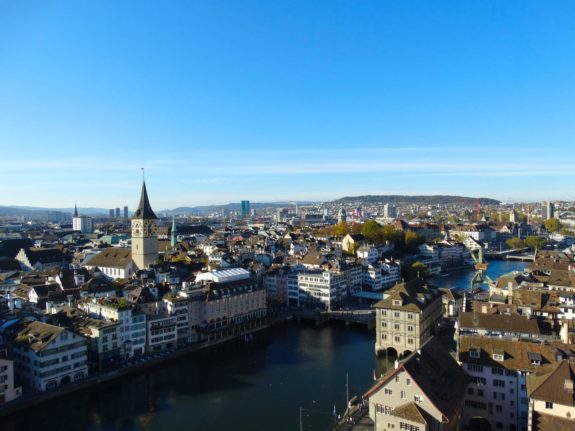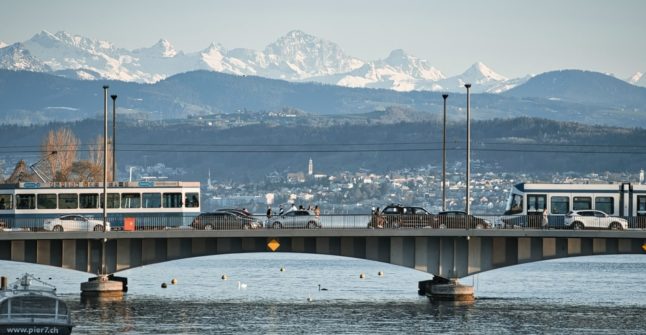Zurich’s international population climbs to record high
A study by the municipal statistical office, as reported in Neue Zuricher Zeitung (NZZ) on Sunday, revealed that more foreigners moved to Zurich in 2022 than ever before.
30,000 foreign nationals have settled in the city in 2022, beating its 2007 record of 28,500 new arrivals from abroad.
Most of the new arrivals have come from the EU – mostly from Germany (4,363) followed by Italy (2,233), Spain (1,216), and France (1,167). 2,742 Ukranian refugees have also relocated to the city this year.
READ ALSO: IN NUMBERS: Zurich’s foreign population climbs to record high
Three-quarters of newly arrived foreigners are under that age of 40 and most of them are highly qualified, and have a bachelor’s degree or higher university education. Interestingly, for the German-speaking city, 12 percent of these arrivals said they mainly use English as their daily language.
Though 2022 marks a high point in the influx of immigrants for Zurich – the number of foreign nationals has been growing steadily for decades and is now more than twice as high as it was 60 years ago.
Reduced bus and tram services from January
At its annual media conference on Tuesday, the Zurich Transport Authority (VBZ) announced that some tram and bus lines will run at a reduced schedule early next year, due to illness-related absences and worker shortages.
The changes will go into effect on January 9th, 2023 and last until spring.
READ ALSO: Today in Switzerland: A roundup of the latest news on Wednesday
Among the affected routes will be tram lines 15 and 17, with the former being suspended altogether, while the latter will run only until 8:30 pm from Monday to Saturday and not at all on Sunday.
Reduced schedule is also planned for bus lines 32, 40, 61, 62, 66, and 89.
“The VBZ regret these adjustments to the schedule and are doing everything in their power to correct the situation,” the company said.
VBZ have introduced the limitations in attempt to keep services running on schedule and to reduce unforseen cancellations. The company said that it has already stepped up its recruitment drive and has introduced further measures to improve the situation next year.
READ ALSO: EXPLAINED: How Swiss public transport tickets are going digital
VBZ recommends that passengers use the online timetable at www.vbz.ch or the ZVV app to help plan their journeys.
Launch of light railway line between Zurich Altstetten and Killwangen-Spreitenbach
After two referendums and five years of construction, the light railway west of Zurich is ready for takeoff this weekend.
The Limmattalbahn light railway, which will connect Zurich Altstetten and Killwangen-Spreitenbach, will officially go into service on Sunday, December 11th.
The new railroad, which cost 700 million Swiss Francs, is intended to absorb the additional traffic in the Limmat Valley, which has grown rapidly in terms of population in recent years.
Heads of Zurich Department of Justice not responsible for data leaks
Last week, several Swiss media outlets reported on leaks of sensitive data from the Zurich Department of Justice between 2006 to 2012.
For years, it emerged, the Zurich Department of Justice had inadequately cleared hard drives which were disposed of after criminal investigations, which led to private data ending up in the hands of criminals in the drug and prostitution business in the city.
The lost information included psychiatric reports, dangerousness reports, mobile phone numbers of police officers and public prosecutors as well as data from the police and justice centres.
READ ALSO: A foreigner’s guide to understanding Swiss politics in five minutes
On Tuesday, the preliminary findings of an external investigation cleared the current heads of the Justice Department, but noted that the way in which the hard drives of the computers were disposed of was “unprofessional, careless and possibly criminally reprehensible”. The cantonal justice minister, Jacqueline Fehr, told the media on Tuesday: “It should never have taken place in this way”.
A criminal investigation is now underway and, for the time being, many questions remain open about the amount of leaked data and its sensitivity.



 Please whitelist us to continue reading.
Please whitelist us to continue reading.
Member comments